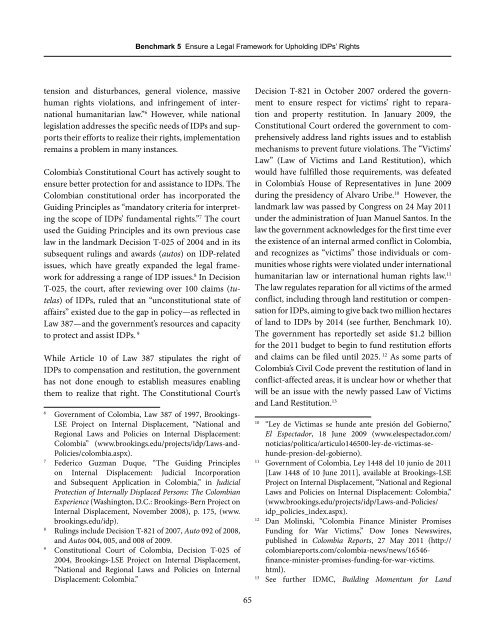From Responsibility to Response: Assessing National - Brookings
From Responsibility to Response: Assessing National - Brookings
From Responsibility to Response: Assessing National - Brookings
Create successful ePaper yourself
Turn your PDF publications into a flip-book with our unique Google optimized e-Paper software.
Benchmark 5 Ensure a Legal Framework for Upholding IDPs’ Rights<br />
tension and disturbances, general violence, massive<br />
human rights violations, and infringement of international<br />
humanitarian law.” 6 However, while national<br />
legislation addresses the specific needs of IDPs and supports<br />
their efforts <strong>to</strong> realize their rights, implementation<br />
remains a problem in many instances.<br />
Colombia’s Constitutional Court has actively sought <strong>to</strong><br />
ensure better protection for and assistance <strong>to</strong> IDPs. The<br />
Colombian constitutional order has incorporated the<br />
Guiding Principles as “manda<strong>to</strong>ry criteria for interpreting<br />
the scope of IDPs’ fundamental rights.” 7 The court<br />
used the Guiding Principles and its own previous case<br />
law in the landmark Decision T-025 of 2004 and in its<br />
subsequent rulings and awards (au<strong>to</strong>s) on IDP-related<br />
issues, which have greatly expanded the legal framework<br />
for addressing a range of IDP issues. 8 In Decision<br />
T-025, the court, after reviewing over 100 claims (tutelas)<br />
of IDPs, ruled that an “unconstitutional state of<br />
affairs” existed due <strong>to</strong> the gap in policy—as reflected in<br />
Law 387—and the government’s resources and capacity<br />
<strong>to</strong> protect and assist IDPs. 9<br />
While Article 10 of Law 387 stipulates the right of<br />
IDPs <strong>to</strong> compensation and restitution, the government<br />
has not done enough <strong>to</strong> establish measures enabling<br />
them <strong>to</strong> realize that right. The Constitutional Court’s<br />
6 Government of Colombia, Law 387 of 1997, <strong>Brookings</strong>-<br />
LSE Project on Internal Displacement, “<strong>National</strong> and<br />
Regional Laws and Policies on Internal Displacement:<br />
Colombia” (www.brookings.edu/projects/idp/Laws-and-<br />
Policies/colombia.aspx).<br />
7 Federico Guzman Duque, “The Guiding Principles<br />
on Internal Displacement: Judicial Incorporation<br />
and Subsequent Application in Colombia,” in Judicial<br />
Protection of Internally Displaced Persons: The Colombian<br />
Experience (Washing<strong>to</strong>n, D.C.: <strong>Brookings</strong>-Bern Project on<br />
Internal Displacement, November 2008), p. 175, (www.<br />
brookings.edu/idp).<br />
8 Rulings include Decision T-821 of 2007, Au<strong>to</strong> 092 of 2008,<br />
and Au<strong>to</strong>s 004, 005, and 008 of 2009.<br />
9 Constitutional Court of Colombia, Decision T-025 of<br />
2004, <strong>Brookings</strong>-LSE Project on Internal Displacement,<br />
“<strong>National</strong> and Regional Laws and Policies on Internal<br />
Displacement: Colombia.”<br />
65<br />
Decision T-821 in Oc<strong>to</strong>ber 2007 ordered the government<br />
<strong>to</strong> ensure respect for victims’ right <strong>to</strong> reparation<br />
and property restitution. In January 2009, the<br />
Constitutional Court ordered the government <strong>to</strong> comprehensively<br />
address land rights issues and <strong>to</strong> establish<br />
mechanisms <strong>to</strong> prevent future violations. The “Victims’<br />
Law” (Law of Victims and Land Restitution), which<br />
would have fulfilled those requirements, was defeated<br />
in Colombia’s House of Representatives in June 2009<br />
during the presidency of Alvaro Uribe. 10 However, the<br />
landmark law was passed by Congress on 24 May 2011<br />
under the administration of Juan Manuel San<strong>to</strong>s. In the<br />
law the government acknowledges for the first time ever<br />
the existence of an internal armed conflict in Colombia,<br />
and recognizes as “victims” those individuals or communities<br />
whose rights were violated under international<br />
humanitarian law or international human rights law. 11<br />
The law regulates reparation for all victims of the armed<br />
conflict, including through land restitution or compensation<br />
for IDPs, aiming <strong>to</strong> give back two million hectares<br />
of land <strong>to</strong> IDPs by 2014 (see further, Benchmark 10).<br />
The government has reportedly set aside $1.2 billion<br />
for the 2011 budget <strong>to</strong> begin <strong>to</strong> fund restitution efforts<br />
and claims can be filed until 2025. 12 As some parts of<br />
Colombia’s Civil Code prevent the restitution of land in<br />
conflict-affected areas, it is unclear how or whether that<br />
will be an issue with the newly passed Law of Victims<br />
and Land Restitution. 13<br />
10 “Ley de Víctimas se hunde ante presión del Gobierno,”<br />
El Espectador, 18 June 2009 (www.elespectador.com/<br />
noticias/politica/articulo146500-ley-de-victimas-sehunde-presion-del-gobierno).<br />
11 Government of Colombia, Ley 1448 del 10 junio de 2011<br />
[Law 1448 of 10 June 2011], available at <strong>Brookings</strong>-LSE<br />
Project on Internal Displacement, “<strong>National</strong> and Regional<br />
Laws and Policies on Internal Displacement: Colombia,”<br />
(www.brookings.edu/projects/idp/Laws-and-Policies/<br />
idp_policies_index.aspx).<br />
12 Dan Molinski, “Colombia Finance Minister Promises<br />
Funding for War Victims,” Dow Jones Newswires,<br />
published in Colombia Reports, 27 May 2011 (http://<br />
colombiareports.com/colombia-news/news/16546finance-minister-promises-funding-for-war-victims.<br />
html).<br />
13 See further IDMC, Building Momentum for Land

















